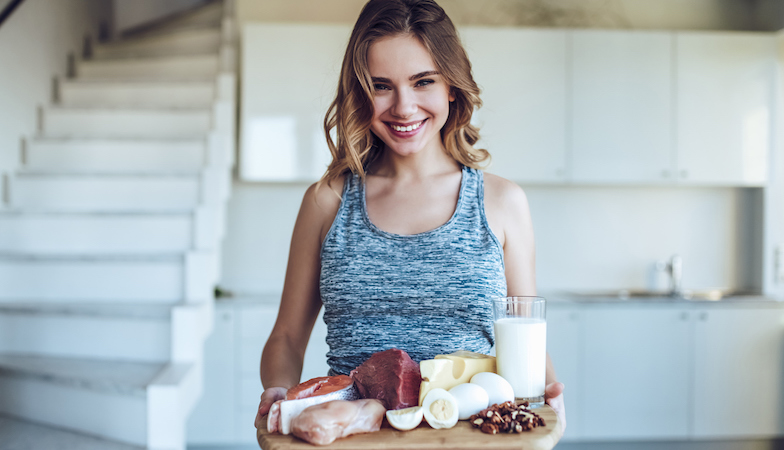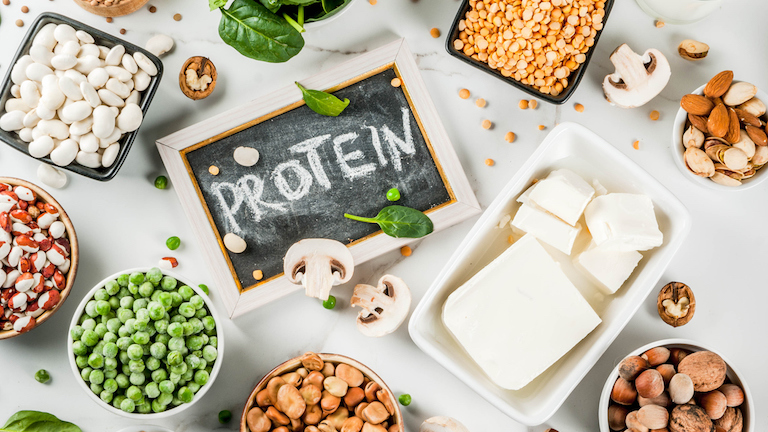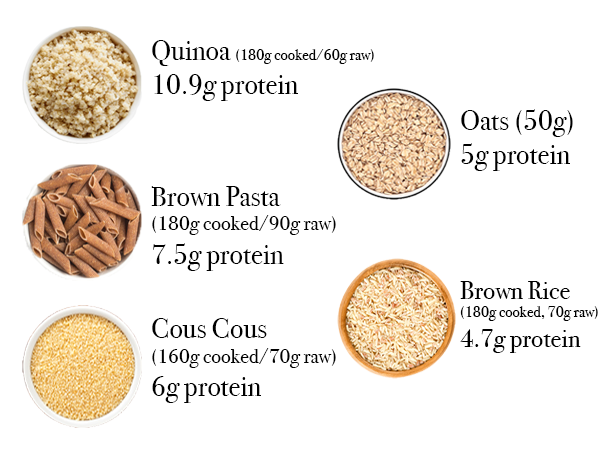Nine in ten of us are conscious of getting enough protein, but less than a fifth know how much we need, new research has found – here’s what you must know to reach your body goals
Protein has become the new black in recent years; the macronutrient literally on everyone’s lips. But according to new research by Healthista, it also comes with a huge knowledge gap.
Over 90 per cent of us don’t know how much we need and more than a third don’t know why we need it, our survey of 1100 women aged 25-65 found.
With the global market for protein products set to reach a staggering $ 48.7 billionUS by 2025 companies are jumping on the bandwagon with such offerings as high-protein Mars and Snickers bars and protein crisps popping up everywhere.
a third of us know we need protein but don’t know why
The rising popularity of diets such as paleo, keto and Whole30 means some of us are turning to beef jerky and boiled chicken for snacking on between meals.
Others shun such high meat diets on the other hand. But they’re still obsessed by protein; only of the plant-based variety.
The huge rise in veganism in recent years means more of us are searching for ways to get our protein sources that don’t involve animal products and where once options available to us were soy protein and hmm, soy protein, now we have hemp, rice, cranberry, pumpkin seed and all manner of nut-based protein options on offer.
All this emphasis on protein suggests we’re a nation of protein aficionados, right? Not exactly.
Fuelled by the rise in demand for information about protein, Healthista conducted a survey of 1100 of our readers to gauge how much they ate, when they ate it and more importantly, what they knew about protein.
Among the most staggering results? Over 90 per cent of us can’t calculate our protein needs and more than a third don’t know why we need it.
Kicking off our Protein Education Special which will run weekly for the next month, we’ve first come up with a list of essential protein food facts that will help you reach your body goals, whether that’s gain, loss or something in between.
The general rule is around 50 grams of protein a day
When we asked readers how much protein they thought they needed day in grams, only a third got it right and one in ten thought we needed just ten grams a day.
The daily reference intake for protein by the NHS is 45 grams a day for women and 55 grams a day for men. That’s about two palm sized portions of meat, fish, poultry, nuts, beans or pulses.
‘But this may not be sufficient if you are exercising because that means your body needs more rebuilding and repair and protein is essential to that process,’ says nutritionist Rick Hay, who lectures in weight management of the College of Naturopathic Medicine. See below for more on that.
This is how to figure out exactly how much protein you need
A whopping 83 per cent of respondents didn’t know how much protein they needed each day and 92 per cent didn’t know how to calculate how much protein they needed.
We weren’t that surprised by that – most of the Healthista team didn’t know either!
‘We don’t study enough about nutrition in schools,’ says Hay. ‘This makes us susceptible to misinformation that can leave us confused at best and lacking essential nutrients at worst.’
So, how can we calculate how much protein our bodies need?
In the UK, adults are advised to eat 0.75g of protein for each kilogram they weigh, based on the Reference Nutrient Intake (RNI). So if you weigh 65kg (10 stone), you should eat about 48.75g of protein a day.
‘If you’re trying to lose weight and exercising around 3-5 times a week, you could up your protein intake to .8 to 1 gram per kilo of body weight,’ says Hay (read why below).
‘If you’re super active, training for an hour daily and wanting to build muscle you could increaser that to 1.2 to 1.7 grams per kilo of body weight,’ says Hay.
Meat is not always better than plant sources

When quizzed on how much protein was in the foods most of us eat everyday, it seems we have been influenced by the chicken breast chugging body builders in every gym.
71% of us thought that there was more protein in 100 grams of chicken than 100 grams of soya beans when in fact, the soya beans contain 36 grams and the chicken only 31 grams.
Meanwhile a third of respondents thought there was more protein in a tablespoon of peanut butter than in a protein bar. But there are only four grams of protein in the peanut butter whereas something like the new KIND all-natural protein bars deliver 12 grams of plant protein.
Here’s a list of protein found in everyday foods (100 gram servings unless stated otherwise) to get you started:
Chicken breast 31g
Soya beans 36g
Lentils 9g
Quinoa 13g
Edamame beans 12g
Atlantic salmon 20g
Sea bass 23.5g
Eggs (two large) 12g
25g egan protein powder 13-16g
Tofu 14g
Lean beef 26g
Turkey breast 29g
KIND PROTEIN bar (one bar) 12g
Protein deficiency is a thing
While a third (31%) of survey respondents said they knew protein was good for them but they didn’t know why, a fifth (19%) couldn’t name a single protein benefit.
Protein contains amino acids that are the essentials of our bodies’ make-up, the key to building and repairing all its cells.
So, if you’re not eating enough protein, you can lose muscle mass, toning and definition, says Rick Hay.
‘This is especially important if you are doing weight training and this causes micro tears in the muscles which then need to be repaired – protein is essential to this process.
‘As hair and nails are largely made of protein, the condition of your skin and nails might deteriorate and in severe cases you may experience hair loss.’
Other problems associated with not eating enough protein include an increased risk of injury while exercising, as well as muscle wasting especially as you get older.
Not eating enough protein can also cause poor wound healing, fatigue and lethargy and a compromised immune system.

Small amounts of protein at every meal will help you lose weight
In the Healthista research, only 15 per cent of respondents said they got a protein fix at every meal and nearly two thirds got their protein fix only at dinner.
‘Most people have a huge protein fix at dinner but very little throughout the day,’ says Hay. ‘This not only puts pressure on the body’s digestion it also doesn’t give your body the best chance to use the protein, breaking it down into amino acids needed to rebuild and reshape the body.
‘If you have too much protein all at once, your body will likely excrete all those precious amino acids through your poo and may store the excess as fat,’ says Hay.
Protein keeps you full
‘Protein is also thermogenic, which means the act of digesting it alone burns more calories than if you were eating just carbs,’ says Hay.
Plus, eating small amounts of protein at every meal help keep you fuller for longer because it takes longer to break down than simple carbohydrates.
The key is to vary the types of proteins you’re getting.
‘The body likes variety and opting for a combination of sources throughout the day in small amounts will ensure that your body is using the protein efficiently – once you’ve figured out how many grams of protein you should be getting a day, spread that out across your three meals and a snack,’ Hay advises.
‘This will ensure you’re kept full between meals, you have fewer cravings and don’t put too much strain on your digestive system’.
Generally, about a (small) palm-sized serving of protein is what to aim for as excess calories from too much protein will be stored as fat.
‘Remember that many protein sources – especially meat – are also high in calories and fat, so opting for a few plant-based sources in your day can keep your calorie and fat content down,’ says Hay.
Protein lessens cravings
That 11am chocolate biscuit habit? You could potentially be free of it by having some quality protein at breakfast.
In fascinating research from the University of Missouri in the US, scientists did MRI scans of people’s brains and found that eating a protein rich breakfast reduced the brain signals controlling food motivation and reward driven eating behaviour – like reaching for the biscuit tin at 11am!
Yet, when we quizzed readers about the benefits of protein, only a third knew it could help stop cravings for unhealthy sweets and crisps.
How does this work? ‘Eating slows down the absorption of sugar from food, which means you’re less likely to get a blood sugar spike and subsequent crash that can cause cravings between meals,’ says Hay.
Eating protein at each meal, works in the same way, just keep portions small.
But even this won’t delete your occasional need for a sweet treat (let’s be serious). ‘If a sweet craving strikes, opt for something like an all natural protein bar,’ says Hay.
Not all protein bars are created equal
It seems you’re not a fan of protein bars – 65 per cent of survey respondents aren’t keen on protein bars, but 73 per cent of them would be more likely to eat one if it were all natural.
‘Most protein bars on offer contain too much sugar or artificial flavourings and ingredients such as gums and binders, giving them that chewy, artificial taste,’ says Hay.
Healthista are loving KIND’s new all-natural protein bars, which contain all-natural ingredients such as nuts and deliver 12 grams of plant-protein per bar.
Naturally sweetened, they can satisfy a sweet need and provide a satisfying snack thanks to their natural high protein content.
Protein and carbs together are the energy Holy Grail
While 30 per cent of respondents in the Healthista survey have snacked on a can of tuna and nothing else and four per cent have eaten a six pack of eggs – talk about desperate – adding some quality carbs that ideally contain some protein, can ensure your snack is more complete, leading to more sustained energy, says Hay.
Here are some protein-rich carbs to opt for:

And some protein rich nuts and seeds to have with them:

If you add a small amount of quality carbohydrates – these can be in the form of complex carbohydrates such as grains and cereals or they can be fruit or vegetables (these are carbs too) if you’re watching your weight.
For example, having some tomato or an oatcake with your tuna, some spinach and/or a little rye bread with your eggs or some nuts/seeds added to your quinoa will give you a more complete meal or snack and give you energy and fullness for longer, without crashes.
More Healthista content:
What are probiotics and how can you find one that works?
What really works for heart health?
